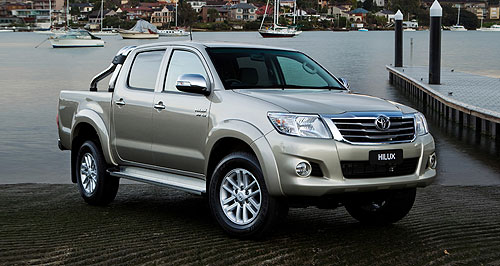Make / Model Search
News - Market Insight - Market Insight 2013Market Insight: Private buyers underpin car industryRent pressure: Rental segment sales of light commercial vehicles such as the Toyota HiLux plummeted 73 per cent in August, to be down almost 50 per cent so far this year. Sales to private car buyers up 10 per cent this year as business, fleets struggleGallery Click to see larger images 9 Sep 2013 By TERRY MARTIN CAR sales to private buyers are underpinning the Australian motor vehicle industry this year, with business, government and rental sales all driving downward. VFACTS figures released last week, just days ahead of Saturday’s federal election, saw private sales up 12 per cent in August with 50,497 units, pushing its progress for the year to date to 10.2 per cent, which is in stark contrast to the other big-volume sectors that have traditionally fortified the industry, particularly with cars produced in Australian factories. As a combination of factors such as fringe benefits tax changes and the federal election campaign intensified last month, vehicle sales for business purposes were down 10 per cent (to 32,331 units), government sales dropped 15.6 per cent (3449) and rental purchases fell by 20.5 per cent (4560) compared to August last year. Business car sales had been climbing, up 4 per cent at the end of the financial year, but last month’s sharp decline pegged YTD growth back to 1.8 per cent. Government sales, meanwhile, have plummeted 25 per cent this year, and rental sales are down 11 per cent, leaving private sales easily the most significant segment in the market, accounting for 53 per cent of all new-vehicle sales with almost 394,000 new registrations for the year thus far. Business sales are hovering just below 283,000 units, while government sales are down to 26,370 and rentals are at around 33,500, from total industry sales of 757,282 – up 4 per cent for the year. The growth in private sales is occurring across passenger, SUV and, significantly, light commercial vehicle segments – the latter up a whopping 34 per cent this year, compared to 4.8 for passenger cars and 12.9 for SUVs – while within the business vehicle sector, SUVs have kept sales ticking along as LCVs remain lineball with last year and passenger cars have fallen. With a change in government over the weekend, and the promise from prime minister-elect Tony Abbott to reverse controversial changes made by Labor to FBT rules, the industry will be anticipating a positive effect on car sales – across all buyer types – in the months ahead. An increase in fleet sales, which have traditionally made up around 50 per cent of the entire market, will be crucial, and a reversal of the FBT rules will go some way to restoring confidence in this sector, according to the Australasian Fleet Management Association (AFMA). Just as other aggrieved industry groups went into overdrive following Labor’s FBT bombshell in July, AFMA held a series of forums in every state capital during August to discuss the changes, with attendees – representing private and publicly listed companies, not-for-profit organisations and government bodies – surveyed on the likely impact on their current vehicle fleets. From a sample size representing more than 126,000 vehicles, the survey – which excluded salary packaged novated leases to show the wider effects on companies and vehicle fleets – found that 49 per cent of respondents intended to reduce their vehicle numbers, buying fewer cars in order to offset the FBT changes. It also found that the vast majority of those surveyed – 90 per cent – expected the changes to adversely affect their organisation financially, operationally and/or administratively. Even with a slight (0.2 per cent) sales downturn in August, the Australian car industry is heading toward another record full-year result, with the YTD SAAR (seasonally adjusted annual rate) of 1.135 million putting it ahead of last year’s tally of 1.112 million. While the market remains buoyant with the increase in sales to private buyers, resurgent fleet and other business sales are required for sustained growth over a longer term. Resetting FBT rules to normal should have an impact on the latter, although it remains to be seen how vehicle buyers of all description respond to the change in federal government, amid widespread cost-cutting and continuing tough economic conditions in many sectors. The Coalition’s tough stance on car industry support is also still to play out as Holden in particular decides on its manufacturing future in the weeks ahead.  Read more5th of September 2013  Coalition vows to remove FBT ‘noose’Shadow minister slams FBT reform and ‘disgraceful slur’ in Labor downplaying impact4th of September 2013  Jobs to go if FBT changes stay: dealersDealer survey indicates that axe hangs over jobs due to FBT switch |
Click to shareMarket Insight articlesResearch Market Insight Motor industry news |












Facebook Twitter Instagram